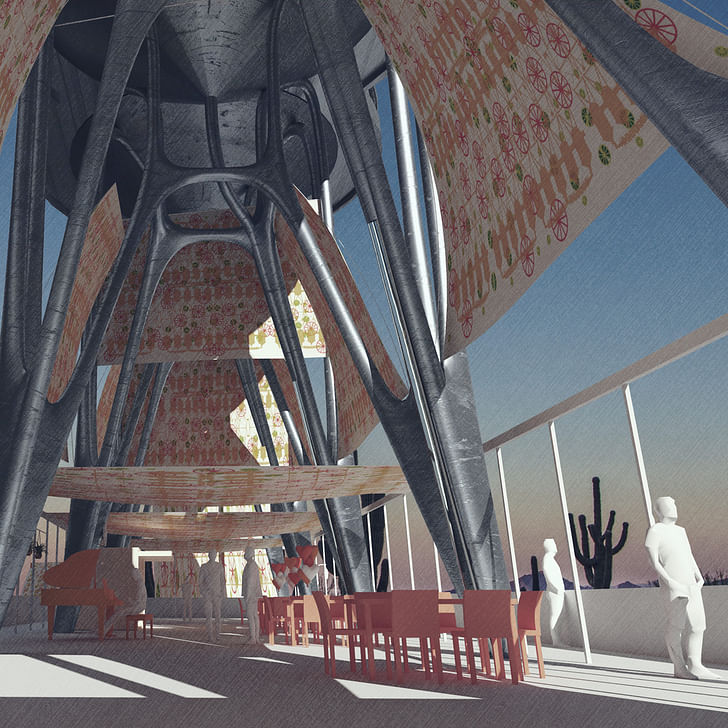

The Summer of 2021 has proven to be another challenging season. However, during this time, architecture students have continued to persevere. By adjusting, exploring, prototyping, and expanding their architectural perspectives, students have used the events taking place in their daily lives to push and challenge the issues facing the industry today. To learn more about these students and the work produced, we continue with our ever-so-popular Archinect Thesis Review series.
We begin our Summer 2021 iteration by connecting with Woodbury School of Architecture B.Arch graduate Khun Hein where he discusses his thesis, WATER INFRA-CULTURE. "Droughts are a significant concern in the present and future, which is exacerbated by ongoing climate change," shares Hein. "Extracting underground water from aquifers in desert conditions is necessary for humans to adapt to the changes we are experiencing in our climate [...] My thesis raises ethical questions and challenges our assumptions about its capability."
These interviews provide a platform for young designers to share their voices and works with the Archinect community by connecting with architecture students. Together Hein and I discuss his experience as a B.Arch student graduating during a turbulent academic year, his thoughts on the industry today, and his next steps as he enters the world of professional practice.
Archinect's Spotlight on 2021 Thesis Projects: Archinect's commitment to highlighting student work doesn't stop at simply sharing student work. Our editorial team focuses on connecting with students and asking questions to learn their process, architectural perspectives, and their take on the industry as young designers. 2020 has been a challenging year for all architecture graduates; to support the class of 2021, we've launched our summer series iteration of Archinect's Thesis Review to highlight the work of thesis students during this unique time of remote learning amid the COVID-19 pandemic. Be sure to follow our 2021 thesis tag to stay up to date as we release new project highlights.
My thesis focuses on underground water, which is an intriguing topic for me because of my interest in the increasingly severe California droughts. — Khun Hein
Can you briefly describe your thesis?
The hinterlands of Los Angeles are a strange mix of suburban outposts and productive agricultural landscapes, both struggling with an unsustainable desire for growth and for water. Much of the water infrastructure for both territories is hidden from sight, as well as from experience, further encouraging false security in an unlimited faraway source. The project proposes a new way of experiencing and stewarding water infrastructure. Taking clues from vernacular and indigenous forms of water distribution, such as the Puquios of Peru, or the Qanat — water infrastructure becomes a spatial here — and a shared social experience. The architecture becomes a device for registering fluctuations: rooms poised for flooding with water from below or light from above, terraces, inclines, floating buoys, water levels stains — all amplify the perception of droughts or of abundance. This is a collective space — a Water Commons — where new practices and culture can emerge which is not simply about extraction and agricultural productivity — but stewarding, replenishing a shared aquifer.

Site Plan. Gif courtesy of Khun Hein
How does your thesis fit within OR challenge the discipline of architecture?
My thesis focuses on underground water, which is an intriguing topic for me because of my interest in the increasingly severe California droughts. Droughts are a significant concern in the present and future, which is exacerbated by ongoing climate change. Extracting underground water from aquifers in desert conditions is necessary for humans to adapt to the changes we are experiencing in our climate. This is also a controversial subject that challenges the disciplines of architecture. My thesis raises ethical questions and challenges our assumptions about its capability. This is an issue that must be approached carefully, due to its implications for our environment. Architecture is moving forward with this new technology and is using the foundations of our knowledge from the past to engage this contemporary issue. In this manner, my thesis applies architecture discipline to modern and developing issues.
The enthusiasm of my professors was integral in developing my thesis, and their encouragement allowed the successful development of this thesis.
Did your thesis change during the pandemic? What difficulties did you face? How did your thesis advisors help you during this time?
My thesis did not change during the COVID-19 pandemic. However, our learning environment has changed with the transition to online learning. New challenges were presented, such as limited face-to-face interactions with my colleagues and professors. Rather than allowing this to limit my discovery of the issue, I embraced the changes caused by the pandemic. I had the privilege of conducting virtual conversations with my instructors to fine-tune my thesis and my work. The enthusiasm of my professors was integral in developing my thesis, and their encouragement allowed the successful development of this thesis.
As a young designer and new graduate, the competitive architecture industry will force me to constantly adapt to the changing nature of the industry.
As a young designer, how do you feel about the architecture industry right now?
In the past, the industry of architecture changed significantly with the development of new technologies, environmental issues, and through transitions in the economy. The industry is facing further challenges and evolution through the COVID-19 pandemic, as it is changing our use of space and design. As a young designer and new graduate, the competitive architecture industry will force me to constantly adapt to the changing nature of the industry.
What has helped prepare you for the workforce?
During the pandemic, learning the intricacies of architectural software has assisted me in preparing to enter the workforce. The ability to successfully utilize new technologies is key to success in this industry and allows for creating solutions to pressing problems. Learning about the discipline of architecture has also prepared me as a designer by providing me with the knowledge.
*Stay tuned for more interviews with students by following Archinect's Thesis Review series.
Are you interested in having your thesis project featured in our series? Reach out at connect@archinect.com with the subject headline "Re: Thesis Review" for an opportunity to be featured.
Katherine is an LA-based writer and editor. She was Archinect's former Editorial Manager and Advertising Manager from 2018 – January 2024. During her time at Archinect, she's conducted and written 100+ interviews and specialty features with architects, designers, academics, and industry ...
2 Comments
The students appear to be more concerned with the aesthetics of the project than the solution...
Don’t know why you’d come to that conclusion, because it looks good ;-)
Block this user
Are you sure you want to block this user and hide all related comments throughout the site?
Archinect
This is your first comment on Archinect. Your comment will be visible once approved.